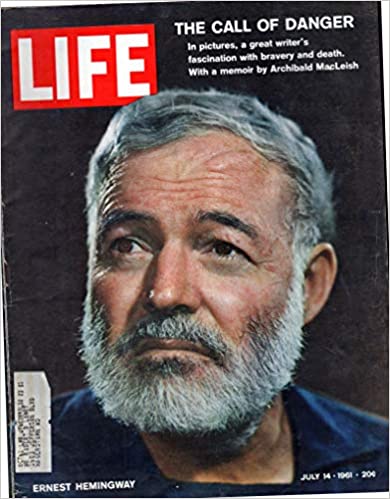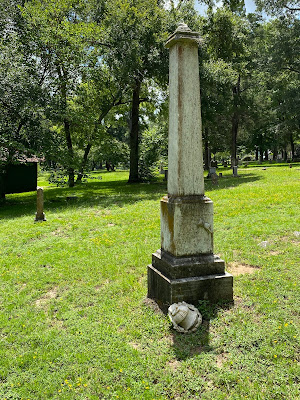A seventeen-year-old book blog offering book reviews and news about authors, publishers, bookstores, and libraries.
Wednesday, July 22, 2020
More Books I Don't Want You to Miss (No. 4)
Tuesday, July 21, 2020
Happy Birthday, Ernest Hemmingway
Every time I think of Hemmingway or read something he wrote, I flashback to the cover of the Life Magazine issue that is dated just a couple of weeks after the author’s suicide. My parents were Life subscribers for decades and much of my world view came from reading those magazines from cover to cover. The idea that so famous and successful a writer as Ernest Hemmingway could, or would, kill himself (especially with a shotgun) just made no sense to me when I was thirteen years old, so this cover is burned deeply in my memory.
Hemmingway was known as a “man’s man,” and because of that I wonder how many female readers he had – or has today (is that a sexist question?). His wartime experiences are legendary, especially those relating to the Spanish Civil War, but Hemmingway also witnessed some of the key moments of World War II, including the Allied landings at Normandy and the liberation of Paris, and served as an ambulance driver during World War I. It was as an eighteen-year-old ambulance driver that he was wounded by mortar fire and received the Italian Silver Medal of Bravery for helping Italian soldiers to safety despite his own wounds. Yes, the hard-living Hemmingway was a man’s man.
Among my favorite Hemmingway works are his short stories and novels like The Old Man and the Sea, For Whom the Bell Tolls, and The Sun Also Rises.
Happy birthday, Ernest Hemmingway.
Monday, July 20, 2020
Britt-Marie Was Here - Fredrik Backman
Backman is a Swedish writer whose books center on some of the quirkiest characters a reader will ever encounter. Luckily for the rest of the world, his five novels have now been translated into 25 languages, including, most thankfully, English. His debut novel, the already mentioned A Man Called Ove (2012), has been followed by My Grandmother Asked Me to Say She’s Sorry (2013), Britt-Marie Was Here (2014), Bear Town (2017), and Us Against You (2018). I wholeheartedly vouch for each of these with the exception of the one I’m yet to read, My Grandmother Asked Me to Say She’s Sorry. Oh, and in order to complete the book-to-movie circle I started with Ove and my discovery of Backman, I should mention that Britt-Marie Was Here has also been adapted into movie form.
Britt-Marie is obsessed with order, a place for everything, and of course, everything in its place. She even judges the character of new acquaintances by the way they organize – or don’t organize – their cutlery drawers. Knives, forks, and spoons all have their assigned place, and Britt-Marie doesn’t really trust people who don’t strictly adhere to that rule. In fact, she even extends the “everything in its place rule” to her husband, and when Britt-Marie learns that he has been cheating on her, she decides that her place is no longer at his side.
That’s how Britt-Marie ends up, all on her own, working as caretaker of the recreation center in Borg, one of Sweden’s most isolated little towns. Borg is so small – and its economy so depressed – that its dwindling population depends on a general store of sorts that stocks a little of just about everything the closed businesses used to sell. It helps not to be too choosy when shopping in Borg. And unbeknownst to Britt-Marie, the recreation center she is responsible for is already scheduled for demolishment. Until that happens, though, Britt-Marie is going to make sure that it’s the cleanest and most efficiently run recreation center in all of Sweden.
Britt-Marie is not what you would call a “people-person.” Her pickiness, combined with an inability to hold her tongue, makes it near impossible for her to make new friends or for her to keep any friends around long enough for them ever to reach the status of old friends. But something strange and unexpected begins to happen when Britt-Marie meets the locals. Strange as they at first seem to her, she starts to like them, and even more surprisingly, they start to like her. But the biggest surprises of all come when Britt-Marie, a woman who knows absolutely nothing about soccer, or any other sport for that matter, agrees to coach the local youth soccer team in their quest to show the neighboring town snobs they can compete with them – even if they do have to practice in a paved parking lot.
Fredrik Backman
I experienced Britt-Marie Was Here in audiobook format as read by Joan Walker. If there is a more perfect reader to capture the character, spirit, and inner thoughts of a woman like Britt-Marie, I can’t imagine who that might be. Even better, Walker uses her voice and variable speech patterns to create several other characters who are all immediately recognizable by the individual vocal patterns and voices she assigns to them. The way that Walker reads some of their conversations is laugh-out-loud funny.
Bottom Line: Britt-Marie Was Here is one of those stories that can make you laugh as easily as it breaks your heart, and it often does both in quick succession. The joy of watching Britt-Marie blossom into the person she was always capable of being is equaled by the townspeople’s reluctant realization that they have come to love the strange little woman who suddenly bursts into their lives. Fredrik Backman has done it again, and in fact, Britt-Marie Was Here just may be my favorite of the four novels of his I’ve now read. (And that is saying a lot.)
Sunday, July 19, 2020
Sometimes, walking around inside an old cemetery is exactly what you need.
 |
| The Monument Added to Sam Houston's Grave in 1911 |
 |
| A typical family plot inside the cemetery |
 |
| Explanation for high percentage of headstones dated 1867 |
 |
| The 1867 epidemic played no favorites. Several clergymen and doctors were also claimed. |
Saturday, July 18, 2020
Quodophiles, One and All
Apparently, I am what is called a quodophile - although I would not recommend that you waste your time looking for the word in any dictionary because you won't be finding it there. And, I’m betting that just about every other book blogger is probably a quodophile, too, because the word simply means that you are a collector of quotes. In our case, that would most often be quotes from authors or books that we read. I’m not sure if writing the quotes down in a little notebook or storing your collection somewhere in the cloud is required for quodophile qualification, but I suspect that it probably is. (Note to self: the only reason your Word dictionary does not flag “quodophile” is that you’ve added it to the dictionary yourself.)
Here, for example, are a few favorites I’ve logged in the last few months:
"How often we made our worst fears come true by behaving as though they already were."
(Inspector Gamache's observation during a Three Pines murder investigation)
"Where was the religion for a man who believed that good and bad must coexist, even within the individual? Where was the religion for a man who believed in God, but not in God's religion?" (Inspector John Rebus reflecting on his relationship to God and to organized religion)
"It's 3:12 a.m., October 1, 2016. I have turned seventy. Daylight will bring slices of cake and cheerful goodwill. It will be like celebrating a hernia."(Tim O'Brien's thoughts upon concluding his seventh decade on the planet)
"Every book in every bookstore is a fresh beginning. Every book is the next iteration of a very old story. Every bookstore, therefore, is like a safe-deposit box for civilization."
Not all of the quotes are the most pleasant thoughts to contemplate...but each of them will make you think.
Friday, July 17, 2020
The End of October - Lawrence Wright
“Disease was more powerful than armies. Disease was more arbitrary than terrorism. Disease was crueler than the human imagination.” (Page 22)
Dr. Henry Parsons first hears of the Kongoli virus at a “parliament of health officials” in Geneva, Switzerland. The next-to-last presentation of the last day of the conference focuses on an unusual cluster of forty-seven bloody deaths in a West Java refugee camp (although it turns out that the camp is actually a prison for Muslim homosexuals). Parsons does not believe the official Indonesian government explanation of the deaths, so he agrees to collect samples from the camp for further study before heading home to Atlanta. But as it turns out, he will not see Atlanta, his wife, or his two children again for a long, long time.
Within hours of his arrival in the squalid camp, Parsons is convinced that an unidentified virus is responsible for the horrendous deaths – and that he has made a terrible, perhaps fatal, mistake by not quarantining his driver before the man could drive away on his own. By the time the driver could be tracked down, he was on the hajj to Mecca along with millions of other devout Muslims. And now everything that can possibly go wrong, is about to. A highly contagious flu virus with a death rate of close to 50% is about to be unleashed on the world.
The second half of The End of October (which is a reference to the expected timing of the second wave of the virus) is more dystopian than the first half of the book. Just about the time that the virus seems to have passed its peak (the old flattening of the curve theory we are all so familiar with by now), “the lights go out” in the United States because the dictators in Russia, Iran, and North Korea (and perhaps others) decide that this is the perfect time to launch an all-out cyber-war against America. But as catastrophic as this second scenario is, it all feels a little rushed and somehow fails to pack the punch provided by the earlier part of Wright’s story.
Lawrence Wright
Bottom Line: The End of October is one of those thrillers (cliché warning) pulled from today’s headlines and, as such, it can be nerve-rackingly scary to read this one at times. Wright’s story also includes concise accounts of the major pandemics that have plagued the world in the past and how those were either dealt with or played themselves out. It’s impossible to put a happy face on this one.
























